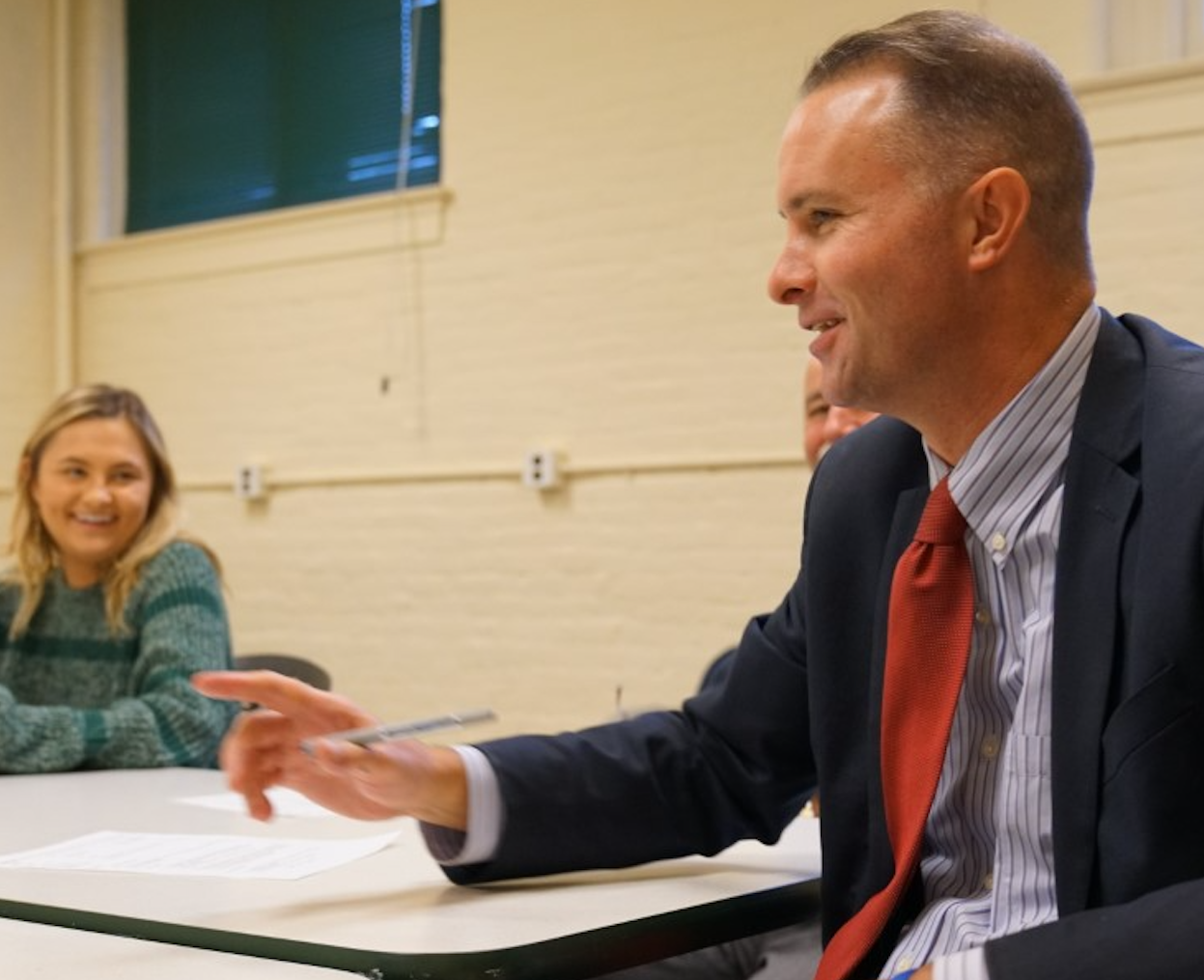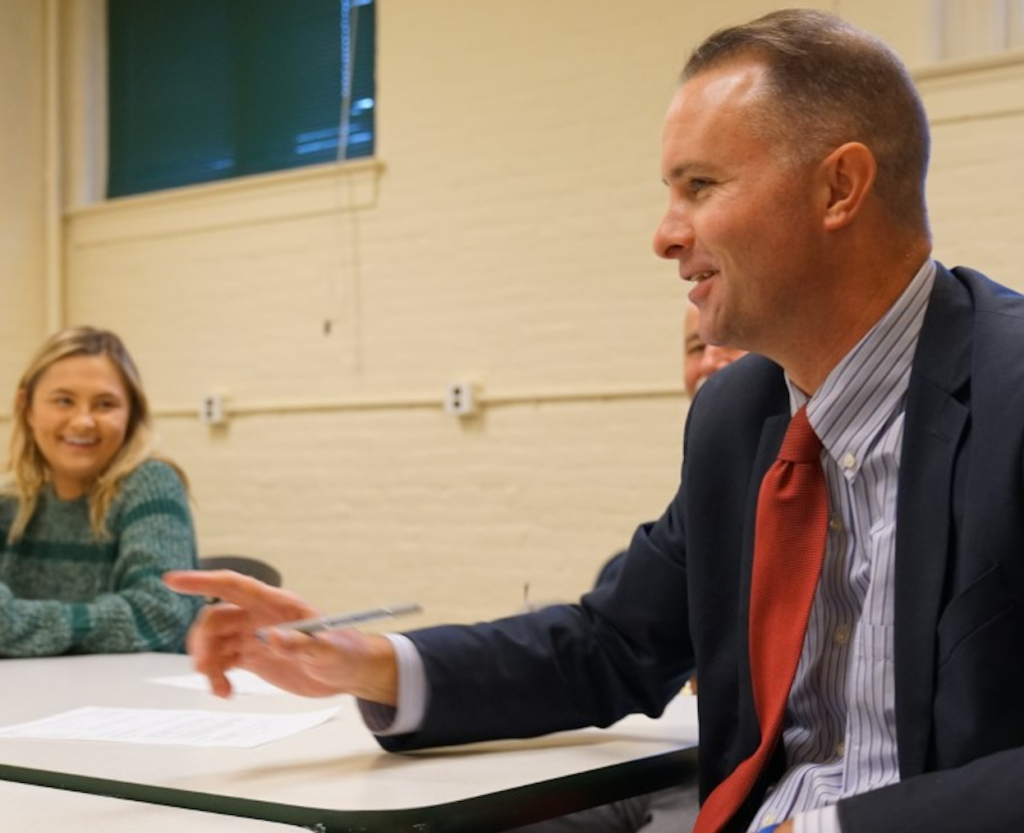
By Elizabeth Hogan
Senior Editor
T.J. Donovan has been the Attorney General of Vermont since 2016, and is once again up for election.As the “people’s lawyer,” Donovan started the Rapid Intervention Community Court or “RICC” which is an award winning criminal justice program made available to non-violent offenders who committed crimes because of addiction or mental illness. He is currently working remotely from his home in Chittenden County, which he shares with his wife Jessica, two sons Jack and Emett, as well as their dog Scout.
Q: You have been the Attorney General of Vermont since 2016. In your opinion what is the most important thing you have learned during this time?
A: “To be responsive and to listen to people. When they call you they are calling you because they need help. [And] to be creative in how we try to solve problems. Being responsive and listening to people and understanding that they’re struggling is probably the most important thing.
Q: In your opinion, how do you campaign effectively in the time of COVID-19?
A: think a mix of traditional media with the news and social media.We have an office facebook, twitter, and instagram. On the political side I have a Facebook, Instagram, and Twitter. You have to communicate with your constituents because you have to tell them the work you are doing and why it is important to them as well as Vermont. if I can get on TV it is probably still the most effective. Then we try to amplify that message through social media.
Q: Tell us about the program Rapid Intervention Community Court (“RICC”) that you created.
A: The program is basically a diversion program for folks who struggle with addiction and mental illness, to keep them out of the criminal justice system. I don’t think the criminal justice system is the right place for those types of cases.
What caused it is just being in a courtroom every day and seeing people who were poor, or addicted to drugs, or people who were sick and saying to myself this isn’t the right place for them. The traditional criminal justice system including jails is an appropriate place for a very limited number of people, but most people are sick. They have addiction issues and the criminal justice system is not the system to fix those issues.
Q: Public safety is an important part of your role as Attorney General, What are your main goals when it comes to public safety?
A: Number one it means that everybody is treated fairly and equally and that everyone has the same opportunity for success. When I talk about public safety I don’t really talk about jail cells or police cruisers or court systems, I talk about a community where people have access to health care, affordable housing, good schools, and kids can grow up here and afford to go to college.
Public safety is really about a safe environment and community, which means really investing in those foundational pillars that build a good community. On a much more direct level domestic violence and sexual violence are big issues and we have to be prepared and immediately responsive to that in order to keep people safe. But, the long term issue of public safety I think is those investments in people in our community.

Q: How do you deal with violent and nonviolent offenders?
A: “ When you talk about murders, sexual violence, and domestic violence I think jail is appropriate in those cases. When you are talking about nonviolent crime you have to look at the underlying root causes of that crime which oftentimes is addiction, mental illness, circumstances regarding poverty and I think we have to have a different approach that is based on public health strategies and restorative justice.”
Q: You are very involved with criminal justice reform, why is this so important? Any issues that you are currently passionate about?
A: We supported a bill that would change the use of force standard in policing. I think that force should only be used when it is absolutely necessary and should be the last resort. I think we have to continue to invest in a deescalation training, cultural competency, and really redefine the way we imagine how we police our communities. I don’t think police should use military style equipment because the message it sends to the community when you’re all kinda geared up and you have assault weapons and tactical vests is you’re telling the community that they are the enemy and we are at war with you. We need more trust in law enforcement and we need more problem solving and less force. I am not naive enough to think that bad things never will happen. I know they will, we see them all the time and we can be prepared. But, let’s have strict guidelines and use that force and equipment only sparingly and only when appropriately. Less is more when it comes to force.
Q: Tensions are currently high in the country between the upcoming elections, COVID-19 , and protests. Do any of these affect your work?
A: This is a moment of reckoning and rightfully so in my opinion, so how do we do better, how do we change, how do we not be afraid to change and bring people along with us, and I think we can do it. We want to minimize the footprint of the criminal justice system, and shrink the footprint of the police and become much more community based and use people’s public health strategies and restorative justice principles to solve disputes and problems while at the same time having that traditional system for the really bad stuff.
Q: You have won many awards, are any of them particularly meaningful?
A: Oh I’m just overrated! Um yes I would say one is I got an award from the Dismas House, which provides transitional housing for people coming out of jail. They are not a religious organization but Dismas the good thief who was with Jesus on Calvary Hill during the crucifixion, it is all about reconciliation. When I was a young guy, I was arrested at 18 years old, I did something stupid, I got drunk and got into a fight. I got probation and a deferred sentence, so I have always kinda realized how privileged I was that my life was protected and my future was protected. So I try to do a lot to reform the criminal justice system to get people second, third, fourth chances because I was the beneficiary of those. But for the grace of god my life could have turned out dramatically different, I would like to pay it forward by reforming the criminal justice system and believing people and giving them opportunities.
Q: Where do you see yourself in five years?
A: Taking care of my family and providing for my family.
Q: Is there anything you would like to say to young people right now?
A: Your generation is making a total difference right now on so many issues. On racial issues, on social justice, on environmental justice, on criminal justice reform and we are listening to you.

